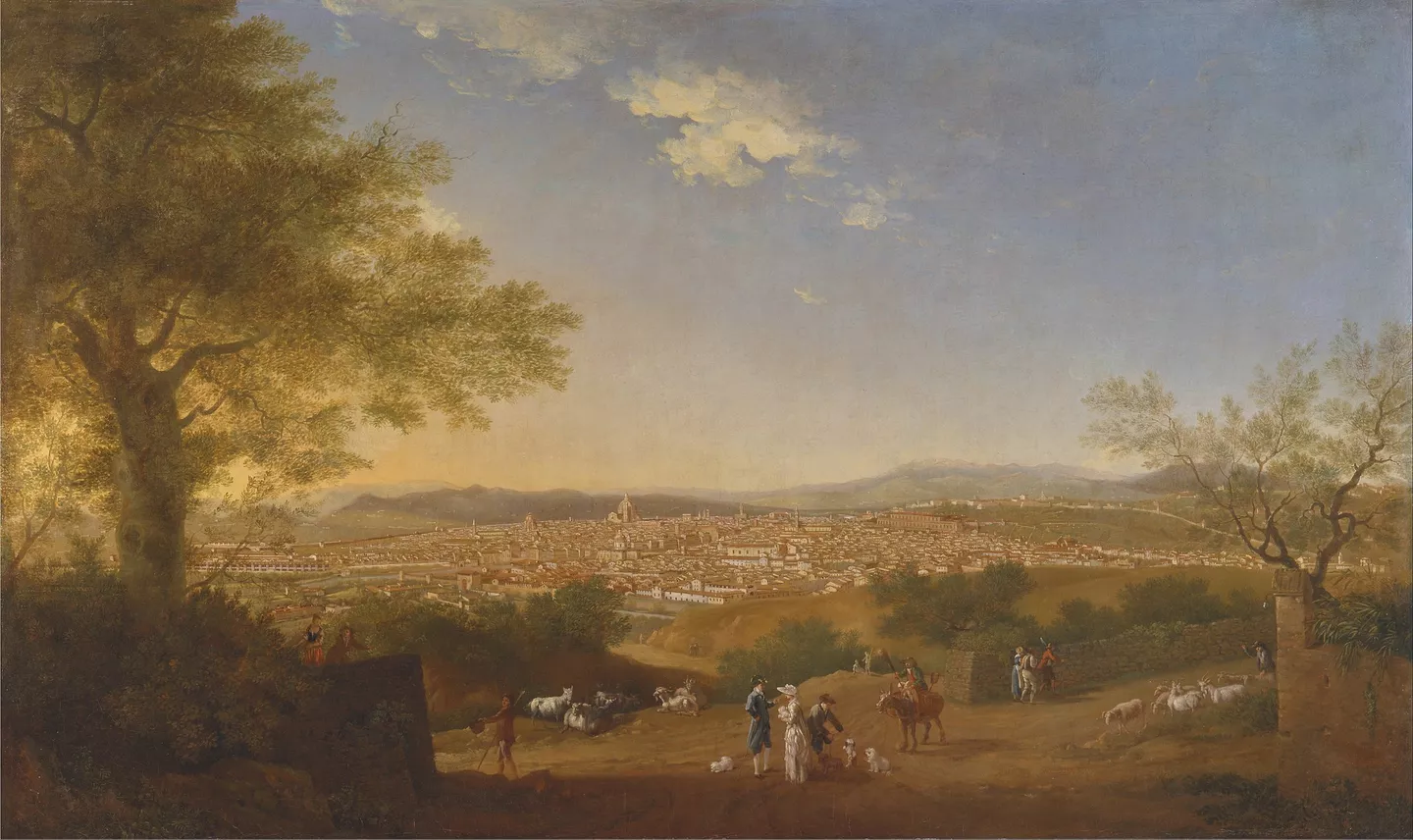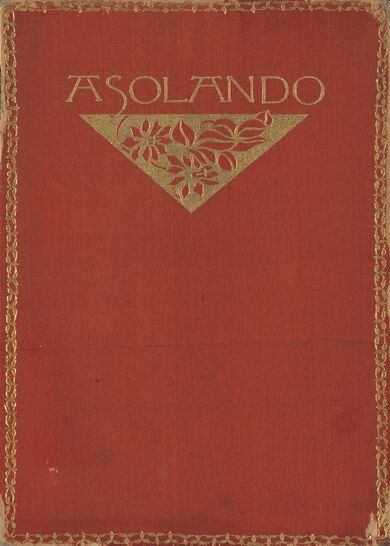
I.
THE MORN when first it thunders in March,
The eel in the pond gives a leap, they say.
As I leaned and looked over the aloed arch
Of the villa-gate this warm March day,
No flash snapped, no dumb thunder rolled
In the valley beneath where, white and wide
And washed by the morning water-gold,
Florence lay out on the mountain-side.
II.
River and bridge and street and square
Lay mine, as much at my beck and call,
Through the live translucent bath of air,
As the sights in a magic crystal ball.
And of all I saw and of all I praised,
The most to praise and the best to see
Was the startling bell-tower Giotto raised:
But why did it more than startle me?
III.
Giotto, how, with that soul of yours,
Could you play me false who loved you so?
Some slights if a certain heart endures
Yet it feels, I would have your fellows know!
Faith—I perceive not why I should care
To break a silence that suits them best,
But the thing grows somewhat hard to bear
When I find a Giotto join the rest.
IV.
On the arch where olives overhead
Print the blue sky with twig and leaf,
(That sharp-curled leaf which they never shed)
’Twixt the aloes, I used to lean in chief,
And mark through the winter afternoons,
By a gift God grants me now and then,
In the mild decline of those suns like moons,
Who walked in Florence, besides her men.
V.
They might chirp and chaffer, come and go
For pleasure or profit, her men alive—
My business was hardly with them, I trow,
But with empty cells of the human hive;
—With the chapter-room, the cloister-porch,
The church’s apsis, aisle or nave,
Its crypt, one fingers along with a torch—
Its face set full for the sun to shave.
VI.
Wherever a fresco peels and drops,
Wherever an outline weakens and wanes
Till the latest life in the painting stops,
Stands One whom each fainter pulse-tick pains!
One, wishful each scrap should clutch the brick,
Each tinge not wholly escape the plaster,
—A lion who dies of an ass’s kick,
The wronged great soul of an ancient Master.
VII.
For oh, this world and the wrong it does
They are safe in heaven with their backs to it,
The Michaels and Rafaels, you hum and buzz
Round the works of, you of the little wit!
Do their eyes contract to the earth’s old scope,
Now that they see God face to face,
And have all attained to be poets, I hope?
’Tis their holiday now, in any case.
VIII.
Much they reck of your praise and you!
But the wronged great souls—can they be quit
Of a world where their work is all to do,
Where you style them, you of the little wit,
Old Master This and Early the Other,
Not dreaming that Old and New are fellows:
A younger succeeds to an elder brother,
Da Vincis derive in good time from Dellos.
IX.
And here where your praise might yield returns,
And a handsome word or two give help,
Here, after your kind, the mastiff girns
And the puppy pack of poodles yelp.
What, not a word for Stefano there,
Of brow once prominent and starry,
Called Nature’s Ape and the world’s despair
For his peerless painting? (See Vasari.)
X.
There stands the Master. Study, my friends,
What a man’s work comes to! So he plans it,
Performs it, perfects it, makes amends
For the toiling and moiling, and there’s its transit!
Happier the thrifty blind-folk labour,
With upturned eye while the hand is busy,
Not sidling a glance at the coin of their neighbour!
’Tis looking downward that makes one dizzy.
XI.
If you knew their work you would deal your dole.
May I take upon me to instruct you?
When Greek Art ran and reached the goal,
Thus much had the world to boast in fruct—
The Truth of Man, as by God first spoken,
Which the actual generations garble,
Was re-uttered, and Soul (which Limbs betoken)
And Limbs (Soul informs) made new in marble.
XII.
So you saw yourself as you wished you were,
As you might have been, as you cannot be;
Earth here, rebuked by Olympus there:
And grew content in your poor degree
With your little power, by those statues’ godhead,
And your little scope, by their eyes’ full sway,
And your little grace, by their grace embodied,
And your little date, by their forms that stay.
XIII.
You would fain be kinglier, say, than I am?
Even so, you will not sit like Theseus.
You would prove a model? The Son of Priam
Has yet the advantage in arms’ and knees’ use.
You’re wroth—can you slay your snake like Apollo?
You’re grieved—still Niobe’s the grander!
You live—there’s the Racers’ frieze to follow—
You die—there’s the dying Alexander.
XIV.
So, testing your weakness by their strength,
Your meagre charms by their rounded beauty,
Measured by Art in your breadth and length,
You learned—to submit is a mortal’s duty.
—When I say “you” ’tis the common soul,
The collective, I mean: the race of Man
That receives life in parts to live in a whole,
And grow here according to God’s clear plan.
XV.
Growth came when, looking your last on them all,
You turned your eyes inwardly one fine day
And cried with a start—What if we so small
Be greater and grander the while than they?
Are they perfect of lineament, perfect of stature?
In both, of such lower types are we
Precisely because of our wider nature;
For time, theirs—ours, for eternity.
XVI.
To-day’s brief passion limits their range;
It seethes with the morrow for us and more.
They are perfect—how else? they shall never change:
We are faulty—why not? we have time in store.
The Artificer’s hand is not arrested
With us—we are rough-hewn, nowise polished:
They stand for our copy, and, once invested
With all they can teach, we shall see them abolished.
XVII.
’Tis a life-long toil till our lump be leaven—
The better! What’s come to perfection perishes.
Things learned on earth, we shall practise in heaven:
Works done least rapidly, Art most cherishes.
Thyself shalt afford the example, Giotto!
Thy one work, not to decrease or diminish,
Done at a stroke, was just (was it not?) “O!”
Thy great Campanile is still to finish.
XVIII.
Is it true that we are now, and shall be hereafter,
But what and where depend on life’s minute?
Hails heavenly cheer or infernal laughter
Our first step out of the gulf or in it?
Shall Man, such step within his endeavour,
Man’s face, have no more play and action
Than joy which is crystallized for ever,
Or grief, an eternal petrifaction?
XIX.
On which I conclude, that the early painters,
To cries of “Greek Art and what more wish you?”—
Replied, “To become now self-acquainters,
And paint man, man,—whatever the issue!
Make new hopes shine through the flesh they fray,
New fears aggrandize the rags and tatters:
To bring the invisible full into play!
Let the visible go to the dogs—what matters?”
XX.
Give these, I say, full honour and glory
For daring so much, before they well did it.
The first of the new, in our race’s story,
Beats the last of the old; ’tis no idle quiddit.
The worthies began a revolution,
Which if on earth you intend to acknowledge,
Why, honour them now—(ends my allocution)
Nor confer your degree when the folk leave college.
XXI.
There’s a fancy some lean to and others hate—
That, when this life is ended, begins
New work for the soul in another state,
Where it strives and gets weary, loses and wins:
Where the strong and the weak, this world’s congeries,
Repeat in large what they practised in small,
Through life after life in unlimited series;
Only the scale’s to be changed, that’s all.
XXII.
Yet I hardly know. When a soul has seen
By the means of Evil that Good is best,
And, through earth and its noise, what is heaven’s serene,—
When our faith in the same has stood the test—
Why, the child grown man, you burn the rod,
The uses of labour are surely done;
There remaineth a rest for the people of God:
And I have had troubles enough, for one.
XXIII.
But at any rate I have loved the season
Of Art’s spring-birth so dim and dewy;
My sculptor is Nicolo the Pisan,
My painter—who but Cimabue?
Nor ever was man of them all indeed,
From these to Ghiberti and Ghirlandaio,
Could say that he missed my critic-meed.
So, now to my special grievance—heigh ho!
XXIV.
Their ghosts still stand, as I said before,
Watching each fresco flaked and rasped,
Blocked up, knocked out, or whitewashed o’er:
—No getting again what the church has grasped!
The works on the wall must take their chance;
“Works never conceded to England’s thick clime!”
(I hope they prefer their inheritance
Of a bucketful of Italian quick-lime.)
XXV.
When they go at length, with such a shaking
Of heads o’er the old delusion, sadly
Each master his way through the black streets taking,
Where many a lost work breathes though badly—
Why don’t they bethink them of who has merited?
Why not reveal, while their pictures dree
Such doom, how a captive might be out-ferreted?
Why is it they never remember me?
XXVI.
Not that I expect the great Bigordi,
Nor Sandro to hear me, chivalric, bellicose;
Nor the wronged Lippino; and not a word I
Say of a scrap of Fr Angelico’s:
But are you too fine, Taddeo Gaddi,
To grant me a taste of your intonaco—
Some Jerome that seeks the heaven with a sad eye?
Not a churlish saint, Lorenzo Monaco?
XXVII.
Could not the ghost with the close red cap,
My Pollajolo, the twice a craftsman,
Save me a sample, give me the hap
Of a muscular Christ that shows the draughtsman?
No Virgin by him the somewhat petty,
Of finical touch and tempera crumbly—
Could not Alesso Baldovinetti
Contribute so much, I ask him humbly?
XXVIII.
Margheritone of Arezzo,
With the grave-clothes garb and swaddling barret
(Why purse up mouth and beak in a pet so,
You bald old saturnine poll-clawed parrot?)
Not a poor glimmering Crucifixion,
Where in the foreground kneels the donor?
If such remain, as is my conviction,
The hoarding it does you but little honour.
XXIX.
They pass; for them the panels may thrill,
The tempera grow alive and tinglish;
Their pictures are left to the mercies still
Of dealers and stealers, Jews and the English,
Who, seeing mere money’s worth in their prize,
Will sell it to somebody calm as Zeno
At naked High Art, and in ecstasies
Before some clay-cold vile Carlino!
XXX.
No matter for these! But Giotto, you,
Have you allowed, as the town-tongues babble it,
Oh, never! it shall not be counted true—
That a certain precious little tablet
Which Buonarroti eyed like a lover,—
Was buried so long in oblivion’s womb
And, left for another than I to discover,
Turns up at last! and to whom?—to whom?
XXXI.
I, that have haunted the dim San Spirito,
(Or was it rather the Ognissanti?)
Patient on altar-step planting a weary toe!
Nay, I shall have it yet! Detur amanti!
My Koh-i-noor—or (if that’s a platitude)
Jewel of Giamschid, the Persian Sofi’s eye
So, in anticipative gratitude,
What if I take up my hope and prophesy?
XXXII.
When the hour grows ripe, and a certain dotard
Is pitched, no parcel that needs invoicing,
To the worse side of the Mont Saint Gothard,
We shall begin by way of rejoicing;
None of that shooting the sky (blank cartridge),
Nor a civic guard, all plumes and lacquer,
Hunting Radetzky’s soul like a partridge
Over Morello with squib and cracker.
XXXIII.
This time we’ll shoot better game and bag ’em hot—
No mere display at the stone of Dante,
But a kind of sober Witan-agemot
(“Casa Guidi,” quod videas ante)
Shall ponder, once Freedom restored to Florence,
How Art may return that departed with her.
Go, hated house, go each trace of the Loraine’s,
And bring us the days of Orgagna hither!
XXXIV.
How we shall prologize, how we shall perorate,
Utter fit things upon art and history—
Feel truth at blood-heat and falsehood at zero rate,
Make of the want of the age no mystery;
Contrast the fructuous and sterile eras,
Show—monarchy ever its uncouth cub licks
Out of the bear’s shape into Chimra’s,
While Pure Art’s birth is still the republic’s.
XXXV.
Then one shall propose (in a speech curt Tuscan,
Expurgate and sober, with scarcely an “issimo,”)
To end now our half-told tale of Cambuscan,
And turn the bell-tower’s alt altissimo.
And fine as the beak of a young beccaccia
The Campanile, the Duomo’s fit ally,
Shall soar up in gold full fifty braccia,
Completing Florence, as Florence Italy.
XXXVI.
Shall I be alive that morning the scaffold
Is broken away, and the long-pent fire,
Like the golden hope of the world, unbaffled
Springs from its sleep, and up goes the spire
While “God and the People” plain for its motto,
Thence the new tricolour flaps at the sky?
At least to foresee that glory of Giotto
And Florence together, the first am I!



